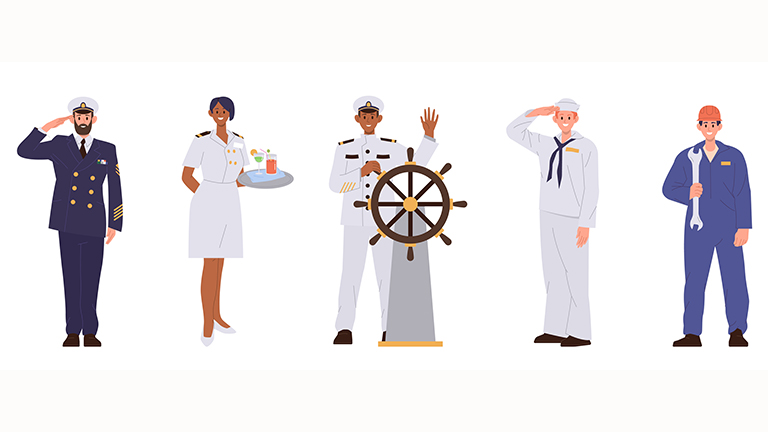
The World Health Organization (WHO, 2022) offers a comprehensive definition of health: “a state of complete physical, mental, social well-being and not merely the absence of disease or infirmity.”
This perspective highlights the multifaceted nature of health, emphasizing that mental and social aspects are as crucial as physical well-being. In tandem, WHO defines wellness as the optimal state of health, or “a positive approach to living.” (WHO, 2022).
The distinction between health and wellness is important; health is the goal, while wellness is the active journey toward achieving that goal. For those working at sea particularly seafarers achieving such wellness is vital for both their personal wellbeing and the safety of the vessels they operate.
The Unique Challenges Faced by Seafarers
Seafarers operate in an environment that presents a distinctive set of challenges. The isolated nature of their work, combined with long hours at sea, demands not only physical strength but also mental resilience. With the mental health crisis amongst seafarers increasingly coming to light, it has become clear that when these workers suffer from psychological distress, the potential for safety incidents on vessels rises significantly. Consequently, fostering a supportive environment for mental health is essential for operational efficacy.
Recent statistics from ISWAN (International Seafarers’ Welfare and Assistance Network) reveal that maritime workers are reaching out for mental health support more than ever before (Anon, 2024). Seafarer Help and Yacht Crew Help reported alarming increases in the number of contacted calls, with statistics showing spikes of 46% and 58% in mental health issues respectively. These rising numbers underscore the critical need for systemic changes that prioritize the psychological wellbeing of seafarers.
Mental Health Struggles and Their Causes
Many seafarers report mental health issues linked to experiences of abuse, bullying, harassment, discrimination, and violence (collectively referred to as ABHDV) (Standard, 2019). Such negative experiences, often exacerbated by excessive work demands, contribute to a compromised sense of safety both personally and for the vessel. For instance, over 10% of seafarers who reached out for help cited unacceptable workloads as a stressor, while more than 13% reported experiencing some level of abuse, including sexual harassment.
Fatigue is a common issue among seafarers and is recognized as a significant factor in mental health concerns. Research shows that 11% of seafarers identified fatigue as a contributory factor to their mental health difficulties.
Furthermore, many seafarers report personal life issues, primarily related to long periods away from loved ones, as impacting their psychological wellbeing.
Gender Disparities
The mental health challenges faced by seafarers are not uniformly experienced across genders. Notably, female seafarers are disproportionately affected by mental health issues. Data from ISWAN (Standard, 2019) indicates that in the last quarter, 24% of those seeking help with mental health concerns were women.
This statistic is especially significant considering the underrepresentation of women in the seafaring workforce, suggesting that women face unique challenges that compound their mental health issues. Reports indicate that female seafarers are more likely than their male counterparts to have experienced forms of abuse at sea.
The Importance of Physical Wellbeing
The physical health of seafarers is critically tied to their mental health. Disturbingly, about 64% (Idwal, 2022) of seafarers are classified as overweight. Poor dietary choices and lack of physical activity are often the primary contributors to this phenomenon. Many seafarers express a desire to eat healthier, yet dietary habits onboard often lack sufficient fresh produce and essential nutrients.
Efforts are needed to enhance the physical wellbeing of seafarers. Education regarding nutrition and initiatives promoting physical activity can significantly benefit their overall health. Options such as fitness contests and access to workout facilities can incentivize seafarers to maintain healthier lifestyles while at sea.

Addressing Workload and Fatigue
Long hours and excessive workloads are not just personal challenges but also pose serious safety issues aboard vessels. By contravening international work-hour regulations, companies inadvertently increase the risk of accidents and health problems among crew members. To combat this, organizations can revise work schedules and limit excessive demands on seafarers.
Effective management strategies may include implementing fatigue management systems, providing ample rest periods, and ensuring that crew members have manageable workloads. Regular assessments of rest and work hours can also help minimize fatigue, allowing seafarers to be more alert and focused on their duties.
Creating a Supportive Mental Health Environment
Establishing mental health initiatives is essential. Training crew members to become mental health champions can provide an accessible outlet for those who may be hesitant to seek help. These champions can help foster a culture of openness, making it safe for crew members to discuss their struggles and access necessary support.
Moreover, programming aimed at educating both seafarers and shore personnel about mental health and wellness can reduce stigma and encourage proactive approaches. Initiatives such as peer support groups and workshops can enhance the mental wellbeing of crew members.
Improving Social Cohesion Onboard
Promoting social engagement is also vital. While modern technology offers connectivity with family back home, it can inadvertently foster isolation among crew members who choose to interact less with their peers. Organizing activities that encourage team bonding and provide social opportunities can enhance morale and emotional wellbeing.
Simple initiatives like team sports, group meals, and social events can create an environment that nurtures relationships among crew members, potentially decreasing feelings of loneliness and increasing overall wellbeing. Establishing communal spaces for interaction can also foster a sense of community onboard.
Advocating for Seafarers’ Rights
Beyond individual efforts to address wellbeing, systemic change is necessary. The maritime industry must advocate for the rights of seafarers to protect them from bullying, harassment, and unsafe working conditions. Recent global events have amplified the vulnerabilities that seafarers face, highlighting the need for comprehensive policies that ensure their rights and wellbeing.
The COVID-19 pandemic specifically exposed many areas requiring improvement in protections for seafarers. Advocating for stronger regulations to protect against workplace violence and promote better mental health support is crucial in helping create safer environments for these essential workers.
The Path Forward
In summary, Mental Health and wellbeing of seafarers require a comprehensive, multifaceted approach that incorporates mental, physical, and social health considerations. The maritime industry holds a responsibility to address these concerns, as improving seafarers’ mental and physical health directly correlates with operational safety and efficiency (LR Foundation, 202).
Investing in the wellbeing of seafarers is not merely a moral obligation; it is a strategic necessity for the maritime sector. By implementing effective mental health initiatives, promoting social interaction, facilitating healthier lifestyles, and advocating for seafarers rights, the maritime industry can navigate the myriad challenges it faces while ensuring that those who keep global trade flowing are supported and valued.
The journey to enhanced wellbeing in the maritime world starts now; it is essential to prioritize the health of those who commit their lives to navigate the seas. As we move forward, a concentrated effort to recognize and address the unique challenges seafarers face will lead to a more sustainable and prosperous maritime industry.
Photo Credits:
First image: zuperia
Second image: gorodenkoff
References
The Global Health Observatory, World Head Organisation. https://www.who.int/data/gho/data/major-themes/health-and-well-being
ISWAN’s helplines report quarterly highs for mental health challenges https://www.iswan.org.uk/news/iswans-helplines-report-quarterly-highs-for-mental-health-challenges/
ISWAN’s helplines report further increase in contacts relating to abuse, bullying, harassment, discrimination, and violence at sea https://www.iswan.org.uk/news/iswans-helplines-report-further-increase-in-contacts-relating-to-abuse-bullying-harassment-discrimination-and-violence-at-sea/
Yves Vandenborn, Director of Loss Prevention, Standard Club, Safet4SEA ATHENS Forum https://youtu.be/YArkCHNOt6U?si=QKcJafhadFnRNzJD
Does seafarer wellbeing have an impact on the integrity and risk of a vessel organised by The Seafarer Happiness Index; The Mission to Seafarers, IDWAL and Standard Club https://youtu.be/dA2WreaJ1XM?si=csH8IU1rW5LtaCUK
Shining a light on seafarer wellbeing June 2022, LR Foundation https://www.lrfoundation.org.uk/496a51/siteassets/pdfs/lr_seafarer_wellbeing_report_final.pdf

Jagmeet
About the author
A unique combination of academic prowess and experience in commercial and technical shipping, dispute resolution and senior management roles defines Jagmeet’s career. He is an independent Arbitrator, Shipping Expert and Lead Faculty for the EMBA by IIM Mumbai and CMMI.
Recently Added
Boundary setting has become somewhat of a catchphrase these days. Movements like ‘MeToo’ and ‘LGBTQ’ have given voice to those previously dismissed and have …
From the 17th – 23rd march Hong Kong along with the world celebrated the neurodiversity celebration week. This week saw several organisations …
Parenting is a universal experience, yet the approaches to raising children vary widely across cultures. In some contexts, independence and individuality are …




